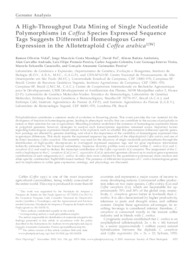A high-throughput data mining of single nucleotide polymorphisms in Coffea species expresed sequence tags suggests differential homeologous gene expression in the allotetrapoloid Coffea arabica.
A high-throughput data mining of single nucleotide polymorphisms in Coffea species expresed sequence tags suggests differential homeologous gene expression in the allotetrapoloid Coffea arabica.
Autoria: VIDAL, R. O.; MONDEGO, J. M. C.; POT, D.; AMBRÓSIO, A. B.; ANDRADE, A. C.; PEREIRA, L. F. P.; COLOMBO, C. A.; VIEIRA, L. G. E.; CARAZZOLLE, M. F.; PEREIRA, G. A. G.
Resumo: Polyploidization constitutes a common mode of evolution in flowering plants. This event provides the raw material for the divergence of function in homeologous genes, leading to phenotypic novelty that can contribute to the success of polyploids in nature or their selection for use in agriculture. Mounting evidence underlined the existence of homeologous expression biases in polyploid genomes; however, strategies to analyze such transcriptome regulation remained scarce. Important factors regarding homeologous expression biases remain to be explored, such as whether this phenomenon influences specific genes, how paralogs are affected by genome doubling, and what is the importance of the variability of homeologous expression bias to genotype differences. This study reports the expressed sequence tag assembly of the allopolyploid Coffea arabica and one of its direct ancestors, Coffea canephora. The assembly was used for the discovery of single nucleotide polymorphisms through the identification of high-quality discrepancies in overlapped expressed sequence tags and for gene expression information indirectly estimated by the transcript redundancy. Sequence diversity profiles were evaluated within C. arabica (Ca) and C. canephora (Cc) and used to deduce the transcript contribution of the Coffea eugenioides (Ce) ancestor. The assignment of the C. arabica haplotypes to the C. canephora (CaCc) or C. eugenioides (CaCe) ancestral genomes allowed us to analyze gene expression contributions of each subgenome in C. arabica. In silico data were validated by the quantitative polymerase chain reaction and allele-specific combination TaqMAMA-based method. The presence of differential expression of C. arabica homeologous genes and its implications in coffee gene expression, ontology, and physiology are discussed.
Ano de publicação: 2010
Tipo de publicação: Artigo de periódico
Palavras-chave: Coffea Arábica
Observações
1 - Por padrão são exibidas publicações dos últimos 20 anos. Para encontrar publicações mais antigas, configure o filtro ano de publicação, colocando o ano a partir do qual você deseja encontrar publicações. O filtro está na coluna da esquerda na busca acima.
2 - Para ler algumas publicações da Embrapa (apenas as que estão em formato ePub), é necessário ter, no celular ou computador, um desses softwares gratuitos. Sistemas Android: Google Play Livros; IOS: iBooks; Windows e Linux: software Calibre.
Acesse outras publicações
Acesse a Base de Dados da Pesquisa Agropecuária (BDPA) para consultar o acervo completo das bibliotecas da Embrapa.

